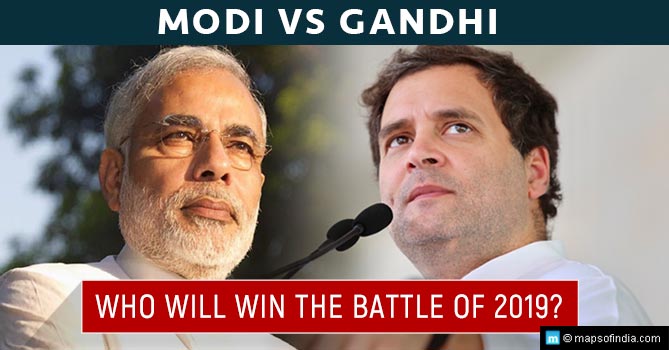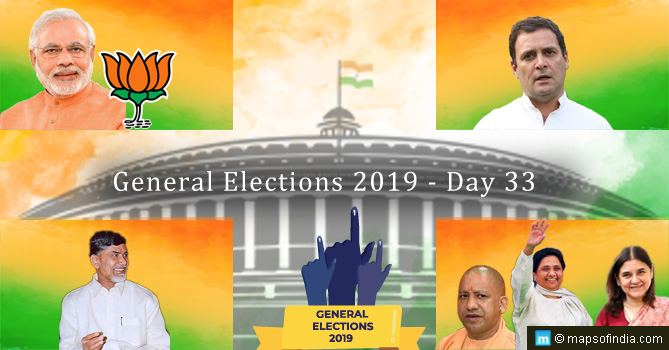Four years ago, Bharatiya Janata Party (BJP) came to power with a thumping victory in the Lok Sabha elections. The “Modi wave” was unstoppable, reaching all the way from Gujarat to Parliament Road, New Delhi. And, as they say, empires fall and rise all the time; so, with the rise of BJP, also came the fall of another power dynamics – the Indian National Congress (INC).
From running the government in the previous term to only securing 44 out of 545 seats, the party fell down a really long way. Many believed that would be the end of Congress in India, and for a long time, it certainly felt so. The people had given their verdict, dissatisfied with Congress; ready to welcome Acchhe Din. However, the tides seem to be changing again.
In 2018 legislative assembly elections, Congress snatched away all the three Hindi belt states from BJP. With the saffron hold loosening from North India for the first time since 2014, people can’t help but ask.
Is Rahul Gandhi, called Pappu by rivals once upon a time, now a serious threat to Modi’s charm? Will Congress manage to ascend back to power in 2019 Lok Sabha elections?
2018 state assembly elections
In December 2018, five key Indian states went to elections, namely- Rajasthan, Madhya Pradesh, Chhattisgarh, Telangana, and Mizoram. Of these, the first three were in BJP’s hold; Rajasthan from 5 years, and both Madhya Pradesh and Chhattisgarh from the past three terms. However, as the results started rolling out, one thing became apparent: this was going to be BJP’s biggest defeat after Modi took office in 2014.
On 17th December, all the three newly-appointed Chief Ministers from Congress took the oath for the next five years. The party has decided to go with experienced leaders – Ashok Gehlot in Rajasthan, Kamal Nath in Madhya Pradesh, and Bhupesh Baghel in Chhattisgarh. Despite PM Modi campaigning with fervour in all the states, addressing rallies, and all BJP “hotshots” swinging into action, the party still couldn’t retain its power.
A wave of change?
While BJP members continue to decline, many people believe that the assembly election results were a sneak peek into what lays ahead. These elections, all in crucial states, were said to be a “reflection” of the upcoming 2019 elections. Or more accurately, they were to be the “semi-final” before the grand match. And, if we were to go by that definition, BJP has good reason to dig out its old battleship plans.
Despite the general shock many have experienced with Congress’s strong return, it was in fact, a gradual and visible journey. In 2017, while Congress managed to come back to power in just one state (Punjab) out of seven, there was one interesting factor to notice.
Gujarat, PM Modi’s home turf was, as expected, won over by Bharatiya Janata Party. However, not only did the saffron-party win 16 seats less than the previous time, Congress’s tally increased by the same number. For a party, that many believed would never return, to perform like that in a state like Gujarat certainly meant something.
Fast forward to 2018, the year witnessed by-elections to Lok Sabha from 10 seats. Of these, 7 were under BJP. However, the party could only retain 2 of these by the end, even losing Gorakhpur, the seat held by Yogi Adityanath continuously since 1998. Both Alwar and Ajmer, previously under BJP, were won over by the Indian National Congress, a feat many credit to Sachin Pilot.
Overview
It doesn’t matter how many arguments are given to the contrary, two things are clear:
a. The Gandhi-led party is not entirely out of the 2019 picture, yet. If anything, it is making a strong return.
b. The charm of Modi, as well as of BJP, though still intact, can no longer be called “invincible”.
The fall of 2014 was a big one for the Congress party, to the extent that Rahul Gandhi had once reportedly given up on 2019, rumoured to have started preparing for 2024 instead. Nonetheless, the party has managed to make an impressive comeback, even if not all the way through. From being a subject of mockery, Rahul Gandhi has been fairly successful in acting meticulously and securing a place of hope for his party.
(Not) A smooth road ahead
Indian National Congress
Things might be looking golden for the Indian National Congress right now, but the party still has a long way to go. Yes, it has gained significant popularity and support, especially with the results of 2018 assembly elections on its proud shoulders. However, there is no denying that BJP still enjoys a strong base in the country, even if we keep communal politics aside. For people to seriously consider Rahul Gandhi as their Prime Minister, INC has to plan the months ahead with great care.
Nepotism: The biggest advantage BJP has over INC, is the apparent dominion of the Gandhi family over the latter. BJP with all its possible drawbacks is still a party without a “family” tag on it. Modi, himself, has on occasions challenged INC to appoint a non-Gandhi party member to the post of president.
There are more challenges in Congress’s bucket. For instance, on December 17, 2018, veteran leader Kamal Nath was appointed the Chief Minister of Madhya Pradesh, post Congress’s victory in the state. Nath has been accused of being a part of the 1984 anti-Sikh riots that resulted in mass murders of the community people. This has understandably hurt the sentiments of many, especially those belonging to the Sikh community. The party will need to work particularly hard now, to build an image of “fair and just” functioning.
Bharatiya Janata Party
Since decades, the Bharatiya Janata Party has enjoyed mass popularity in the northern states of India. However, with Rajasthan, Chhattisgarh, and Madhya Pradesh now out of its grasp, that image appears to have been shaken.
The biggest challenge for BJP and a major advantage to Congress would be the former’s track record in the past five years. While INC has the golden card of being out of power in the previous term, and hence, a lack of accountability, BJP has to answer for its fall-outs from 2014. The party has been severely criticised on issues like employment generation, demonetisation, freedom of press etc. Even if we assume that the dissatisfaction is not disastrously high, the party would still need a very strong display of strength to come back to power.
The party will also face the possibility of a grand opposition alliance against itself.
Conclusion
The road ahead will be challenging for both Congress and BJP. However, the political climate of the country has made one thing clear: it will no longer be just a one man’s show, as witnessed in 2014. The Bharatiya Janata Party has a legitimate threat in Congress, and surprisingly for many, in Rahul Gandhi, as well.
The state assembly elections might have been a preview, but the 2019 war is sure to come packed with plenty of surprises.





